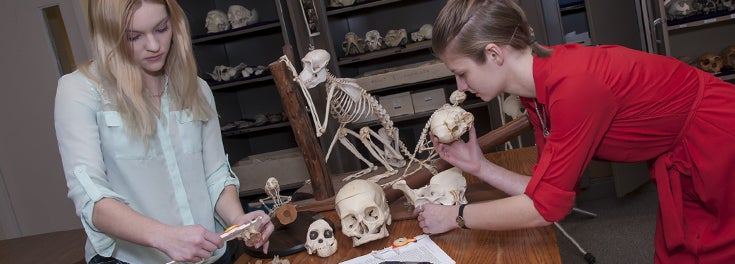
Leah Eccleston fell in love with anthropology after taking just one class in the subject at URI. She said it reminded her of finding animal bones when exploring local forests as a child. Today the junior anthropology and biology major is examining fossilized skulls and pelvises in a research project on reproduction in human ancestors. She says it’s mostly about how much energy early humans put into gestation and fetal growth, but it’s also related to diet, walking gait, brain size and the shape of the birth canal.
Anthropology is such an exciting field because to do it well – to understand and to discover meaningful aspects of humankind and its history – you’ve got to literally explore the Earth. ~ Professor Dunsworth.
Sophomore Samantha Tickey is working right alongside Leah, but she’s trying to figure out the evolution of tail loss in humans and other primates. She’s studying fossil skeletons in museum collections and comparing tail vertebrae across various species to determine when tails started shortening. “Tail loss is a crucial part of the story of hominid evolution,” Samantha said. “Hair loss and tail loss are some of the major factors that differentiate people and other primates.”
Leah and Samantha’s professor, Holly Dunsworth, has garnered global acclaim for her studies of ape and human evolution, including discoveries that are challenging long-held beliefs about why human pregnancy is nine months long. She’s been featured on television programs in the U.S. and Britain, quoted in dozens of news stories, and invited to speak at prominent venues around the globe.
Professor Dunsworth calls anthropology a highly interdisciplinary field that incorporates studies of linguistics, biology, culture and archaeology. And here at URI you can learn and work on projects in all of those disciplines. For instance, you could study human foraging behaviors with Associate Professor Kristine Bovy to learn about the environment based on the food ancient humans ate. Or interview fishermen in Puerto Rico with Assistant Professor Carlos Garcia-Quijano to learn how traditional knowledge of fishing practices can help manage the coastal ecosystem. Or travel to Oaxaca, Mexico, with Professor Rosaria Pisa to experience how people in other cultures cultivate their food, prepare it, enjoy it, and do so sustainably.
“Anthropology is such an exciting field because to do it well – to understand and to discover meaningful aspects of humankind and its history – you’ve got to literally explore the Earth,” said Professor Dunsworth.
And you can begin that exploration right here.
